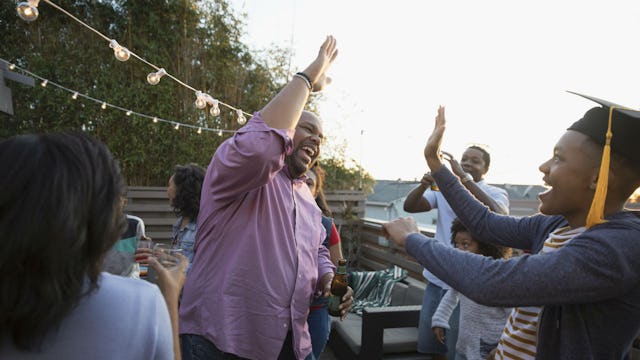We Are Only As Happy As Our Least Happy Child, And This Is Why

I remember standing in my kitchen, the night before my first born child was about to start kindergarten. I was bawling. Like hot-mess-ugly-cry-swollen-eyes-for-days face. I was so scared for him—all of his success and happiness consuming my every thought. Because that’s what we do, as mothers.
Well, a recent study in The Journals of Gerontology has great news (and by “great,” I mean a little depressing). Turns out, even when I’m middle-aged (which is still really far away, so back off, looming 40s), my mental stability and overall happiness will still be tied up in my kids.
As a grown woman who is very close to her parents, I can see how this goes. Parents never stop parenting. If I’m sick, my mother will worry furiously over my health from four states away. There’s nothing she can do, but she will not rest or breathe calmly until I’m okay. So it’s not surprising to learn that this anxiety I have over my kids making friends or getting picked to play Four Square at recess never actually goes away. And that I’ll still worry just as much 25 years from now. Can’t wait!
“Parents tend to view their offspring as extensions of themselves, even after their children are grown,” the study, led by Karen Fingerman, a UT Human Development and Family Sciences professor, reports. “As such, parents may experience lower well-being when grown children suffer problems. Likewise, parents may experience increased well-being when children are successful.”
That’s exactly how I felt that August night four years ago. Getting my son ready to face the world in full-day kindergarten had been my job. His success or failure was a direct reflection of me. So even though I don’t yet have adult children, I can identify with that mindset—that they are extensions of us. Of our work. Of our efforts. Their achievements become our achievements. And their downfalls ours as well.
The study goes on to say that “Due to their investment in offspring, parents may be distressed when offspring incur difficulties.” Well, yeah. Of course.
I grew each of these people in my body and pushed them out and then nursed them and cleaned them and taught them how to sit up and walk and eat with a fork. I taught them their letters and numbers and how to share and say “please” and “thank you.” I stared at the ceiling all night worrying about allergies and fevers and if they could wipe their own butts at school. “Investment” is such an appropriate word for what we do, isn’t it? The financial investments—school and sports and camps and sneakers and cleats and Christmas dresses and school supplies. But there’s the emotional investment too. And that’s what takes its toll on us, as parents.
And for those of us with more than one child, the study finds that our happiness is more impacted by one child’s failures than by our other kids’ successes. Following the saying “A mother is only as happy as her least happy child,” if we have two adult kids with all the success and joy in the world, but we have one who keeps running into a wall (literally or figuratively), we are more likely to be crying in our black coffee at 6 a.m. while we peruse our AARP magazines.
If our kids struggle, we often feel like we failed. It’s just how parenting goes. Also, we may worry that they won’t be there to take care of us—you know, return the favor since we gave them life? By the time they are adults themselves, the tables are supposed to turn, right? We survived the toddler years and the teenage years and now it’s our turn to take a cruise or move to Arizona and sit on something called a lanai like a damn Golden Girl. So if they are coming at us with drama, it can really do some harm to our tired, old selves.
So here’s my takeaway from this study and what I’d like to say to my kids:
Dear offspring, I want you to succeed and not be a total fuck-up, TBH. Go see the world and do good things.Then come visit me and eat Jell-O and play Bingo and tell me all about it. But. If you struggle in life, like I did many times, I’m here. If you fall, my heart will break along with yours. It’s okay though— I’ve been doing it since you walked into school with a Paw Patrol backpack at five years old. I know the drill.
This article was originally published on